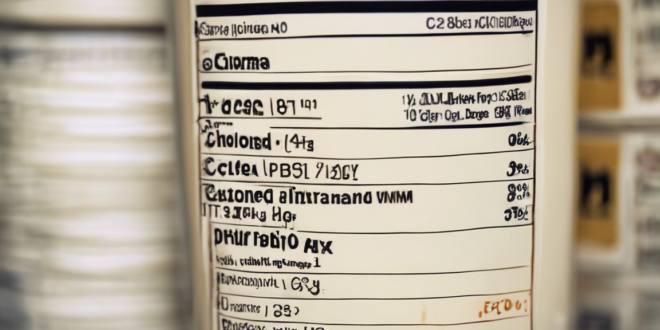Opinion: Nutrition Labels Beyond Politics – A Call for Science-Driven Food Transparency
In the complex landscape of American food policy, nutrition labels have become more than just informative graphics—they are battlegrounds of political ideology, scientific debate, and consumer rights. What should be a straightforward tool for public health has transformed into a contentious arena where various stakeholders vie for influence, often obscuring the fundamental purpose of providing clear, accurate nutritional information.
The Current State of Nutrition Labeling
Nutrition labels have historically been designed to empower consumers with critical information about the food they consume. However, the current system has increasingly become compromised by political interventions that prioritize economic interests over public health. The intricate dance between food manufacturers, agricultural lobbies, and regulatory bodies has frequently resulted in labels that are more reflective of negotiated compromises than scientific consensus.
Political Interference in Nutritional Guidance
The most significant challenge facing nutrition labeling is the pervasive political influence that distorts scientific recommendations. Political actors, often representing specific industry interests, have repeatedly attempted to modify labeling requirements to suit their economic agendas. This intervention undermines the primary goal of nutrition labels: to provide consumers with transparent, accurate information about the nutritional content of their food.
The Economic Dimensions of Food Labeling
Food manufacturers and agricultural corporations wield substantial economic power in shaping nutrition label regulations. Their lobbying efforts can significantly impact how ingredients are classified, serving sizes are determined, and nutritional values are presented. This economic pressure creates a systemic bias that often prioritizes marketing strategies over genuine nutritional transparency.
For instance, the sugar industry has historically invested considerable resources in influencing nutritional guidelines, attempting to minimize the negative perception of added sugars. By strategically positioning their interests within regulatory frameworks, these corporations can effectively shape public perception and consumer understanding.
Scientific Integrity vs. Political Manipulation
Nutrition science is a dynamic field continuously evolving with new research and understanding. However, political interference frequently constrains the ability of scientific experts to implement evidence-based label modifications. The result is a labeling system that lags behind current nutritional knowledge, potentially misleading consumers about the health implications of their dietary choices.
Consumer Rights and Nutritional Transparency
At its core, nutrition labeling should be a consumer protection mechanism. Individuals have the fundamental right to understand what they are consuming, including comprehensive information about nutritional content, potential health impacts, and ingredient origins. Political manipulation of this system directly undermines these consumer rights.
Proposed Solutions for Depoliticizing Nutrition Labels
To restore the integrity of nutrition labeling, several strategic interventions are necessary:
1. Establish an independent, scientifically-driven oversight committee
2. Implement strict conflict-of-interest regulations for panel members
3. Create transparent processes for label modifications
4. Mandate regular reviews of nutritional guidelines based on contemporary scientific research
International Comparative Perspectives
Many developed nations have already implemented more robust and politically neutral nutrition labeling systems. Countries like Sweden, the United Kingdom, and Canada have developed comprehensive frameworks that prioritize consumer education and scientific accuracy over political compromise.
Technological Innovation and Future Labeling
Emerging technologies offer promising solutions for more dynamic and transparent nutrition labeling. Digital platforms, smartphone applications, and advanced scanning technologies could provide real-time, comprehensive nutritional information that transcends traditional static label limitations.
The Role of Public Education
Ultimately, addressing the politicization of nutrition labels requires a multifaceted approach that includes robust public education. By enhancing nutritional literacy, consumers can become more discerning, demanding greater transparency and holding both political actors and food manufacturers accountable.
Conclusion: A Path Forward
Depoliticizing nutrition labels is not merely a regulatory challenge but a critical public health imperative. By recommitting to scientific integrity, consumer rights, and transparent information dissemination, we can transform nutrition labels from politically contested documents into genuine tools for individual and collective well-being.
The journey toward truly independent, science-driven nutrition labeling will require sustained effort, political courage, and an unwavering commitment to public health. It is a challenge we must embrace for the nutritional future of our nation.
 Good Calories Guide GoodCalories Guide focuses on nutrition, healthy eating, and overall wellness. The site offers practical insights into evidence-based dietary practices, including tips for specific lifestyles such as veganism, keto, and family-friendly meal planning. It also addresses unique nutritional needs for individuals with conditions like diabetes or food allergies, while providing quick and accessible recipes to make healthy living a sustainable and enjoyable choice.
Good Calories Guide GoodCalories Guide focuses on nutrition, healthy eating, and overall wellness. The site offers practical insights into evidence-based dietary practices, including tips for specific lifestyles such as veganism, keto, and family-friendly meal planning. It also addresses unique nutritional needs for individuals with conditions like diabetes or food allergies, while providing quick and accessible recipes to make healthy living a sustainable and enjoyable choice.


